How do I handle the logistics of delivering products to retail chains?
Hello everyone, this is Karen Waksman, founder of Retail MBA. Today, we’re going to delve into the complexities of logistics when it comes to delivering products to retail chains. If you have a great product and are looking to break into the retail market, understanding the logistics is crucial. This article will provide you with insights and considerations to help you navigate this aspect of retail sales.
Understanding Retail Chain Logistics
Retail chains manage a vast array of products from numerous vendors. They operate through various channels, including physical warehouses and online platforms. As a supplier, it’s essential to know where and how to deliver your products based on the specific agreements you have with a retailer.
Key Delivery Options
- Distribution Centers: Often, you might be required to ship your products to one or several of the retailer’s distribution centers. Large chains like Walmart have multiple centers across the country to manage their extensive inventory.
- Drop Shipping: Some retailers might prefer drop shipping, where you or your logistics partner ship the product directly to the customer upon purchase. This method is increasingly popular due to its efficiency and cost-effectiveness.
- Direct Store Delivery: In certain cases, retailers may request shipments directly to individual stores. This can vary greatly depending on the size and distribution strategy of the retail chain.
Factors Influencing Delivery Methods
The method chosen for delivering products to retail chains can depend on several factors:
- Contractual Agreements: The specifics of your contract with a retailer will dictate the delivery requirements. Each retailer has different logistics preferences and capabilities.
- Retailer Size and Scope: Larger retailers with widespread distribution networks might have different requirements compared to smaller, more localized stores.
- Product Type: Certain products might require special handling, storage, or delivery processes, influencing how they must be shipped.
Handling Logistics: Practical Tips
Navigating the logistics of retail delivery can be daunting. Here are some practical tips to help you manage this process effectively:
- Understand the Contract: Always review your contractual obligations related to logistics and delivery. Knowing the details can help you prepare for the requirements and avoid any surprises.
- Cost Considerations: Determine whether the retailer covers any logistics costs or if these will be your responsibility. This will significantly impact your pricing strategy and profitability.
- Logistics Partners: Consider partnering with a logistics company that specializes in retail deliveries. They can offer valuable insights and services to streamline your distribution process.
- Flexibility: Be prepared for various scenarios. Retailers might change their logistics requirements based on market demands or their internal policies.
Why Logistics Flexibility is Crucial
Retail logistics are not one-size-fits-all. Being flexible and prepared for different delivery scenarios can save you from potential headaches. For instance, if a retailer suddenly requests deliveries to individual stores across the country, knowing your cost structure and having a logistics plan in place will be invaluable.
Conclusion
Delivering products to retail chains involves navigating a complex and often variable logistics landscape. By understanding the different delivery methods and preparing for various scenarios, you can ensure a smoother operation and maintain profitability. Remember, the specifics of each deal can greatly influence the logistics process, so stay informed and adaptable.
Retail MBA can guide you through these complexities, offering detailed insights and support to help you approach, pitch, and sell to retailers effectively. For more comprehensive guidance on dealing with product deliverability and other retail-related challenges, consider exploring our resources at Retail MBA.
Thank you for joining me in this exploration of retail logistics. Whether you’re just starting out or looking to improve your existing processes, I hope this article has provided you with valuable insights to help you succeed in the retail market.
For more information on how to navigate the retail landscape and optimize your product delivery strategies, visit Retail MBA. We’re here to help you achieve your retail goals with expert advice and comprehensive training programs.
Thank you for reading, and best of luck with your retail endeavors!
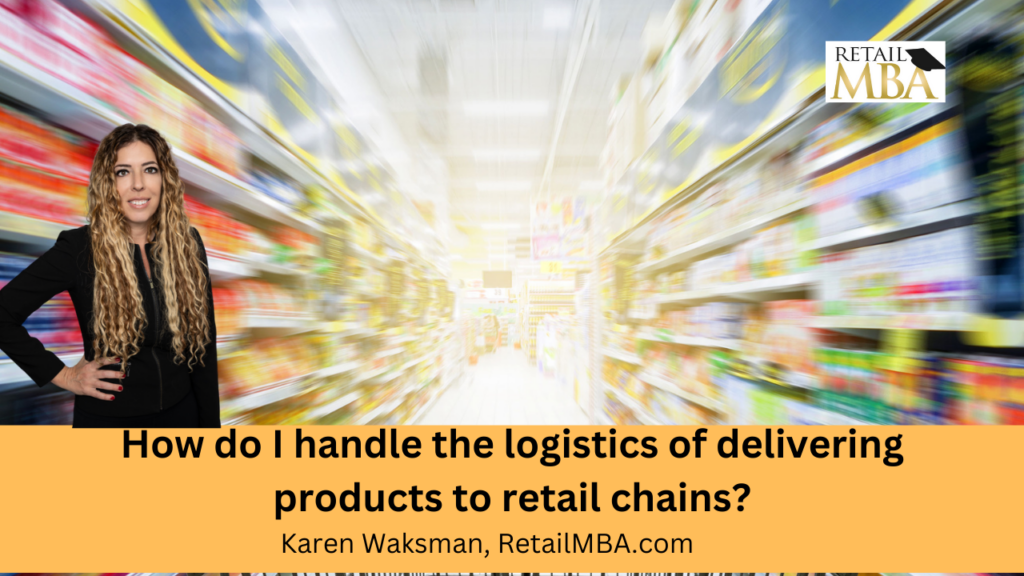
Here are a few other blog posts you might be interested in:
Step-by-step training on how to sell to retail chains!
We explain exactly how to do that and how to get started today. I’ve taught over 100,000 of companies over the years across the globe on how to get your products to the stores. And so we’re here to support you. Or please subscribe to our Youtube channel and or be on the lookout for additional training that we create.
We are here to expedite the process of generating revenue with your physical products and that’s what we’re all about. Take a look at our advanced training, live events, certification programs and so much more.
In this training, I will discuss some of the things to think about when approaching a retailer to sell your products and become a vendor. Hope it helps! 🙂
Karen Waksman,
Retail MBA
Questions? Contact Us!
1-855-Retail-2 (Call or Text)
Email: info@retailmba.com
Retail MBA provides a step-by-step formula on How to Sell to Major Retailers, Online Retailers, Smaller Retailers, Catalogs and More. No Experience Required! These solutions continue to convert for clients year-over-year! These are Time-Tested and Proven Strategies that we utilize ourselves when going after stores! Everything we teach, we test. Want access to these formulas? ANY one of our programs and coaching systems gives you access to them now. With that said…
Here are 5 Easy Ways to Work with Us:
1) Free Training – If You Would Like to Join Our Next FREE Webinar Training Called “Retail Chain Store Secrets – How to Sell to Major Retail Chains. No Experience Required” Then Sign Up NOW To Learn All About Selling into Retail Chains By Clicking Here!
2) Retail MBA Year Long Coaching and Training System – Our Year Long Coaching and Training System with Karen Waksman is POWERFUL! This is our most popular training and coaching system! We walk you through how to approach, pitch and sell to retail chains and we coach you along the way! Join us by Clicking Here!
3) Masterclass Intensives – Want to Join our Next 4 Week Elite Retail MBA Masterclass Intensive? These Intensives Are EPIC for people who Love Fast Paced Learning – Homework, Retail Coaching, Developing Your Strategy, Buyers Contacts and More! These Events Are Held Every Quarter. Join us by Clicking Here!
4) Done-for-You Program – If You Want Karen Waksman and Her Team to Reach Out to Your Top Dream Retail Chains On Your Behalf – And You Have a Retail-Ready Product, Check Out our Epic Done-For-You Service by Clicking Here!
5) In Person Events – If You Want to Learn LIVE and Meet Karen Waksman in Person at Our Next “America’s Next Retail Product: LIVE Event with Other Like-Minded Individuals in Beautiful San Diego, CA! We Would LOVE to Have You Join Us by Clicking Here!

Check Out Our Additional Blog Posts Here:
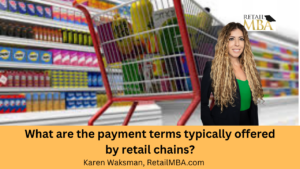
Retail Terms
Retail Terms – What are the payment terms typically offered by retail chains? Click Here to Learn More!
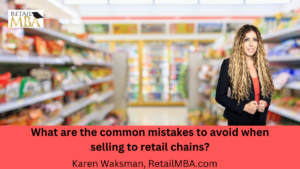
Retail Vendor
Retail Vendor – What are the common mistakes to avoid when selling to retail chains? Click Here to Learn More!
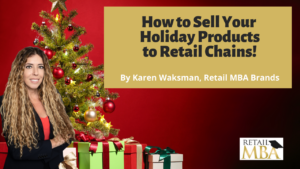
How to Sell Your Holiday Products to Retail Chains
New Training on How to Sell Your Holiday Products to Retail Chains
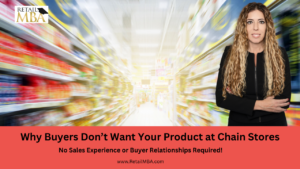
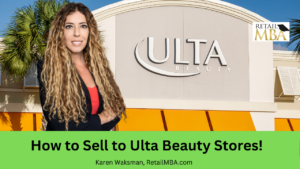
Ulta Beauty Vendor
Ulta Beauty Vendor – How to Sell to Ulta Beauty Stores. Click Here to Learn More!
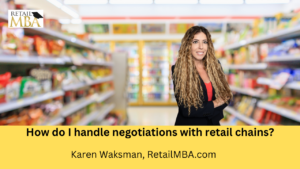
Retail Strategy
Retail Strategy – How do I handle negotiations with retail chains? Click Here to Learn More!

